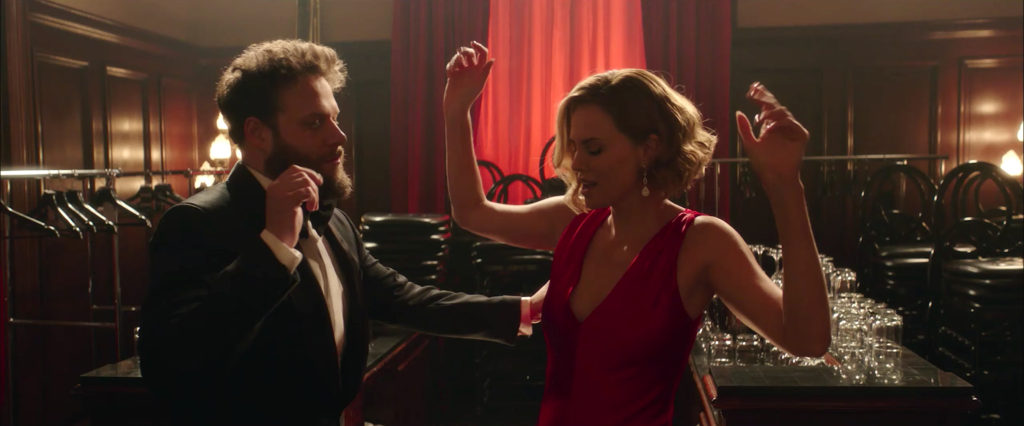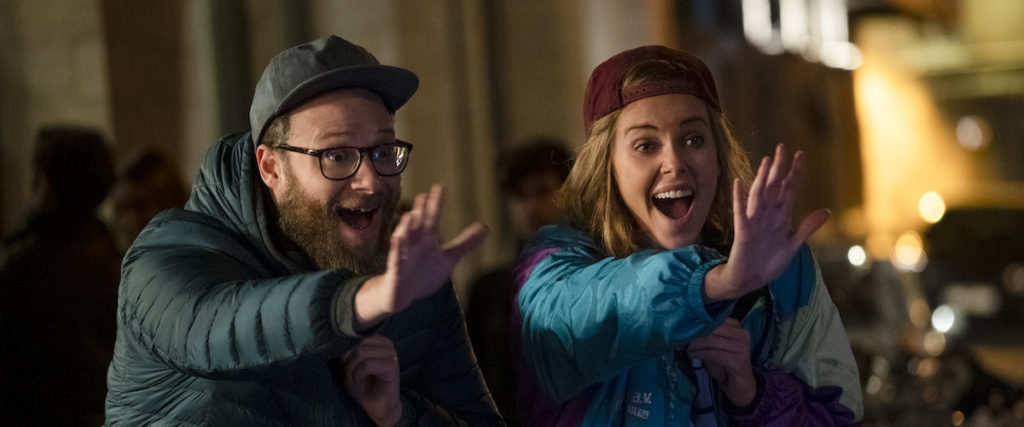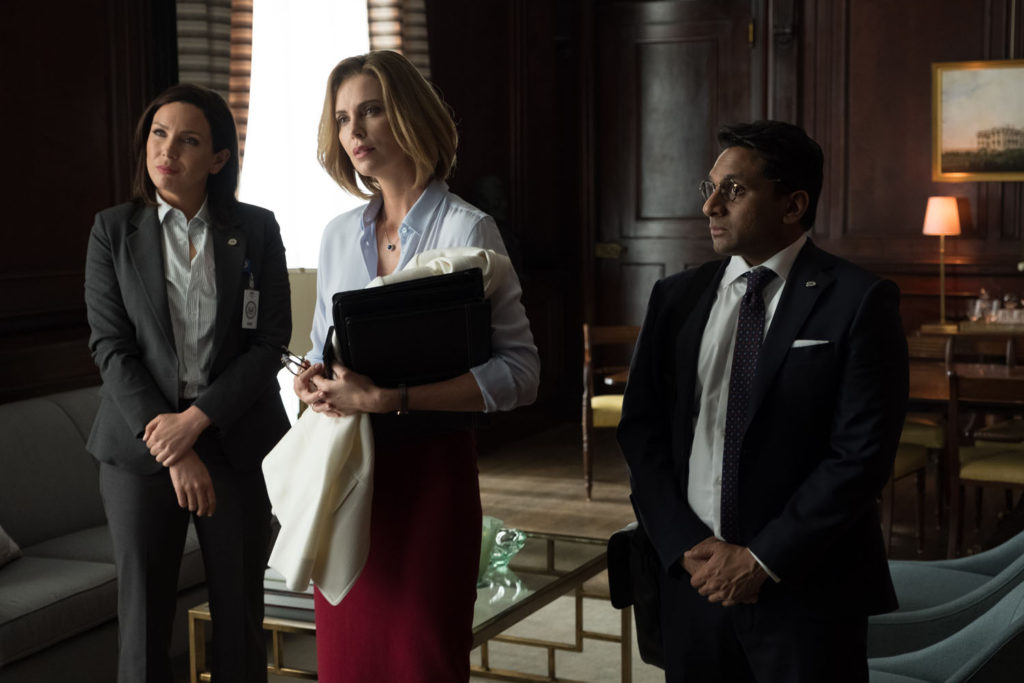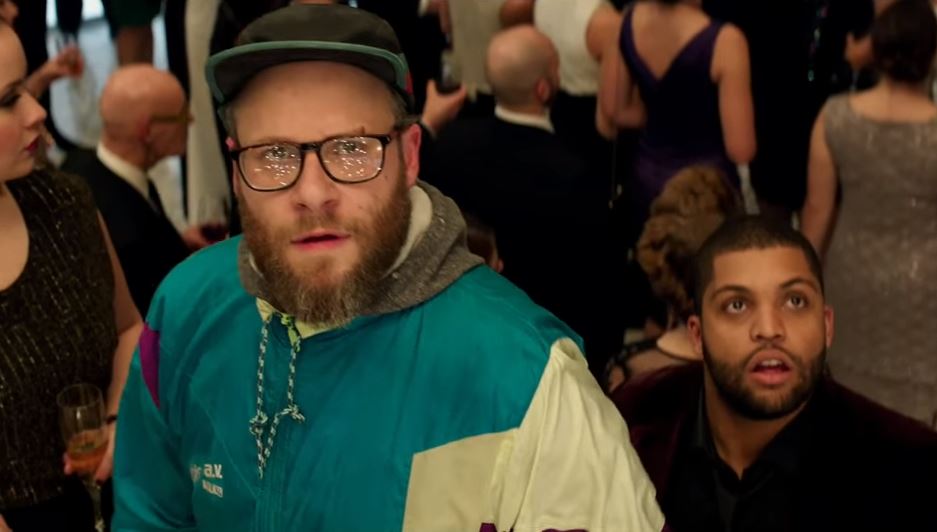
A romantic fantasy in more ways than one, Long Shot is a beauty-and-the-beast love story that simultaneously aspires to work as a thorny quasi-satire of contemporary politics. It aims not only to tell a crowd-pleasing tale of sweetness and levity, but also to impart a valuable message to the American electorate. This is a laudable idea, one with a rich cinematic history; Aaron Sorkin fans will fondly remember The American President, while film enthusiasts of a different generation may recall Mr. Smith Goes to Washington. But to borrow language from the political realm, Long Shot is a smoke-and-mirrors candidate, spouting handsome rhetoric but skimping on actual, meaningful substance. When the pairing of Seth Rogen and Charlize Theron is one of the more credible ideas on screen, you have perpetrated a fraud on the moviegoing public.
Have I gone too far? Maybe. If you approach Long Shot while wearing a certain set of blinders—if you ignore its poisonous ideas and its philosophical sloppiness—you may perceive it as a harmless little rom-com, a passably diverting use of two hours. The acting is quite good, not only from the leads but also the supporting cast, in particular June Diane Raphael as a dubious staffer and O’Shea Jackson Jr. as a loyal confidant. The script, by Dan Sterling (The Interview) and Liz Hannah (The Post), isn’t nearly as hilarious as it thinks it is, but it features its share of clever lines, while the direction, by Jonathan Levine (50/50), includes the occasional visual flourish amid the forgettable point-and-shoot mundanity. Theron gets to do a spit take and simulate rolling on molly, while Rogen, best known for his verbal dexterity, receives an opportunity to showcase his gifts as a physical comedian. It is an avowed cinematic truth that watching a man fall down a flight of stairs is always funny, as is seeing him spurt bodily fluids in unintended places.
Of course, arguably the biggest joke of all in Long Shot is that the schlubby Rogen and the statuesque Theron might make believable, reciprocal lovers. To its credit, the film leans into this implausibility, repeatedly remarking on its central couple’s physical asymmetry. Besides, chemistry at the movies is a matter of more than just looks, and Rogen and Theron, through sharp timing and suggestive body language, cultivate a playful, natural rapport. The actors plainly like working together, which helps us buy the prospect of their characters getting together.

Their partnership, first professional and then personal, is initially founded not in sex and attraction but in ideas and idealism. Rogen’s character, Fred Flarsky, is an outspoken liberal columnist at a New York rag; when his paper gets bought out by a conservative conglomerate, he quits in a self-righteous rage. Less belligerent but equally passionate is Charlotte Field (Theron), the current Secretary of State who’s eyeing a presidential run. The two share a cute history—she was his babysitter as a teenager, leading to an appropriately mortifying flashback—and after they reconnect at a soiree, Charlotte hires Fred to punch up her speeches with his trademark humor.
“Trademark” being a relative term. Throughout Long Shot, we are informed that Fred is a brilliant and savage writer, but while Rogen supplies a typically loose and self-deprecating performance, there is little evidence of his character’s comedic genius on screen. We see snippets of some of his former columns, which feature purportedly incendiary headlines like “Fuck Exxon” and “The two-party system can suck a dick (actually, two dicks).” How witty! The cognitive dissonance persists in his work as a speechwriter; when Charlotte delivers a few zingers that Fred composed about Beverly Hills 90210 and Blockbuster Video, her audience laughs appreciatively, even though little of what she’s saying is funny.

This is something of a problem, given that the entire premise of Long Shot is “irreverent funnyman helps robotic politician loosen up”. But it’s hardly fatal, and for a time the movie skates by on its actors’ charms. It starts sinking, however, when it attempts to fuse its romantic aspirations with its political ones. Charlotte’s key campaign issue is the environment, which she’s attempting to protect through a massive global initiative called Bees, Seas, and Trees. This perturbs the current President (Bob Odenkirk, intermittently amusing), whose endorsement she needs; it also enrages Parker Wembley (an unrecognizable Andy Serkis), the unruly head of a far-right media corporation who’s clearly designed to evoke Rupert Murdoch, with a rumpled dash of Steve Bannon. Fearful of damaging her candidacy, Charlotte begins waffling on her prestigious pact—“We had to lose the trees,” is an actual line of dialogue—which angers the quixotic Fred, who equates her capitulation with betrayal.
The conception of politics as a suffering of compromises—as striking a balance between principle and pragmatism—is nothing new. What rankles about Long Shot is how it pretends to advance a genuine political message, yet puts virtually no thought into articulating what that message might be. Its platform is little more than a series of simplistic platitudes—the environment is good, hiding who you really are is bad—that scan as sound bites a middle schooler might trot out when running for student council.

Oh relax, you might say, it’s just a silly rom-com! But Long Shot wants to be more than a disposable also-ran, which is what makes its intellectual laziness so frustrating. Its vacuity becomes most galling in a late scene where Fred confers with his best friend, discovers that there are decent people on Both Sides, and learns that he needs to be more respectful of others’ viewpoints. It’s a moment that seems calculated to mollify any members of the audience whose feathers may have been ruffled by the film’s vaguely liberal slant. For a movie that ostensibly abhors the prospect of sacrificing your values, Long Shot itself reeks of cowardice.
I might be more tolerant myself if the script were funnier or smarter. But in its second half, Long Shot lapses into a series of idiotic sequences—a hostage negotiation, a blackmail subplot—that make little comic or narrative sense. It’s as though the movie is trying to check as many boxes as possible, which may in fact encapsulate its only true ideology. Long Shot pretends to be raunchy and provocative, but in reality it’s rigorously inoffensive, endeavoring to be liked by as many people as possible. In other words, all it really cares about is not losing your vote.
Grade: C
Jeremy Beck is the editor-in-chief of MovieManifesto. He watches more movies and television than he probably should.
